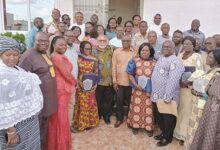
About 60 experts in environmental and social risk management from Africa are to benefit from a course aimed at equipping them with the necessary knowledge and skills for identifying and managing environmental and social risks associated with development projects.
The course, “Essential of Environmental and Social Risk Management (ESRM),” is being offered by the Regional Transport Research and Education Centre (TRECK) of Kwame Nkrumah University of Science and Technology (KNUST) and the Ghana Institute of Management and Public Administration (GIMPA), in Collaboration with the World Bank.
The 10 units includes Introduction to ESR; Regulatory and Institutional Framework for ESRM; Stakeholders Engagement; Social Inclusion in Development Projects; Environmental and Social Impacts Assessment and Environmental Grievances Redress Mechanisms.
The others were Environmental Risks and Impacts; Monitoring and Evaluation in Projects; Grievances and Redress Mechanisms and Mainstreaming ESRM into Public Procurement and Budgeting Process.
Speaking in Accra yesterday, Prof. Charles Amoatey, Director, Academy of Leadership and Executive Training, GIMPA, said the course had brought together project managers, staff of Ministries Departments and Agencies (MDAs), project implementers involved in development or donor-funded projects, local government staff among others who were involved in development projects “to train them on how they can manage the social environmental risks associated with projects being implemented.”
He said the course which would end on Friday, had a blended learning approach of online and face-to-face sessions and entailed field visits and hands-on group works with certificates to be presented at the end of the course.
Prof. Amoatey emphasised the need for governments across the continent to have and implement frameworks to estimate the risks for every project.
For Ghana, he said the challenge was not with having a management framework but with the enforcement of policies for the management of risks associated with development projects.
“So we are hoping that once we have the implementers of the programmes here, they will ensure that every project they design, they apply the framework to ensure that all environmental risks issues are properly managed,” he added.
Prof. Amoatey said the field trip was to give them hands-on experience on the course and brace them up for existing and upcoming development projects.
A representative of the World Bank, Steffen Soulejman Janus urged participants to take the course seriously as they were at the forefront of development projects.
He said participants should be mindful of their actions and inactions as people’s wellbeing and that of the environment depended on it.
Mr Janus stated that there were still some potential unintended consequences and impacts of projects that people needed to be aware of “and it’s your role to make sure that people are aware so we can identify them and if you don’t do it, nobody else will.”
As such, he also encouraged the participants not to pose themselves as students but experts who were willing to share their knowledge and enquire on challenging matters.
BY ABIGAIL ARTHUR







